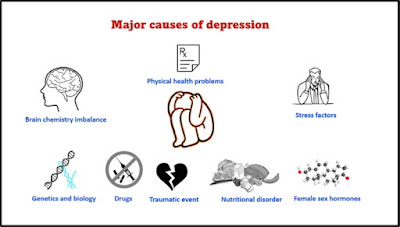Understanding the Depths: Causes of Depression
Introduction
Depression is a complex and often misunderstood mental health condition that affects millions of people worldwide. While it may seem like a shadowy cloud with no discernible source, depression is usually rooted in a combination of factors. In this article, we will delve into the intricacies of this condition, exploring the various causes that contribute to its development. Understanding these causes is the first step toward effectively managing and treating depression.
Genetic Predisposition
The Family Connection
One of the fundamental causes of depression is genetics. Research has shown that individuals with a family history of depression are more likely to develop the condition themselves. This suggests a genetic predisposition, where certain genes may make individuals more susceptible to depressive episodes.
Brain Chemistry Imbalance
The Role of Neurotransmitters
Depression is closely tied to imbalances in brain chemistry. Neurotransmitters, such as serotonin and dopamine, play a vital role in regulating mood. When there is a disruption in the levels of these chemicals, it can lead to depressive symptoms.
Traumatic Life Events
Emotional Scars
Traumatic experiences, such as the loss of a loved one, physical or emotional abuse, or a significant life change, can trigger depression. These events can leave emotional scars that may manifest as persistent sadness, hopelessness, or anxiety.
Chronic Stress
The Weight of Daily Life
Continual exposure to stress can overwhelm an individual's coping mechanisms, leading to depression. Stressful situations at work, financial difficulties, or ongoing family issues can all contribute to the development of this mental health condition.
Hormonal Changes
The Rollercoaster of Hormones
Hormonal fluctuations can also be a contributing factor. This is particularly relevant for women, as hormonal changes during menstruation, pregnancy, or menopause can affect mood regulation and potentially lead to depression.
Substance Abuse
The Escape Trap
Substance abuse, including alcohol and drug addiction, often co-occurs with depression. Individuals may turn to these substances as a means of self-medication, but in the long run, it only exacerbates their depressive symptoms.
Social Isolation
Loneliness and Depression
Humans are social creatures, and social isolation can affect mental health. Lack of social support, loneliness, and feelings of isolation can contribute to developing and worsening depression.
Chronic Illness
The Body-Mind Connection
Chronic medical conditions, such as cancer, diabetes, or chronic pain, can be emotionally draining and lead to depression. The interplay between physical health and mental health is undeniable.
Medication Side Effects
Unintended Consequences
Interestingly, some medications used to treat other conditions can have depression as a side effect. It's crucial for individuals to be aware of the potential effects of their medications on their mental health.
Childhood Trauma
Lingering Effects
Childhood trauma, such as neglect, abuse, or loss of a parent, can have long-lasting effects on mental health. These early experiences can shape an individual's emotional well-being in adulthood.
Environmental Factors
The Impact of Surroundings
Environmental factors, such as living in a high-stress neighborhood or experiencing natural disasters, can contribute to the development of depression. These external pressures can be overwhelming.
Financial Hardship
The Weight of Money Troubles
Financial struggles and instability can lead to chronic stress, anxiety, and ultimately, depression. The pressure to make ends meet can take a toll on one's mental health.
Lack of Physical Activity
Mind and Body Connection
Physical inactivity is not only detrimental to physical health but also affects mental well-being. Regular exercise is known to boost mood and reduce the risk of depression.
Conclusion
In conclusion, depression is a multi-faceted condition with various causes. It can stem from genetic predisposition, brain chemistry imbalances, traumatic life events, and chronic stress, among other factors. Understanding the complex interplay of these causes is essential for effective management and treatment.
FAQs
1. Is depression solely caused by genetics?
No, depression is a result of a combination of genetic, environmental, and psychological factors.
2. Can depression be prevented?
While it cannot always be prevented, a healthy lifestyle, social support, and early intervention can reduce the risk.
3. Are all forms of depression the same?
No, there are different types of depression, each with its unique causes and symptoms.
4. Is medication always necessary for treating depression?
Medication may be one part of treatment, but therapy and lifestyle changes are often crucial as well.
5. How can I help a loved one with depression?
Offering support, encouraging them to seek professional help, and being patient are essential in helping a loved one with depression.






Comments
Post a Comment